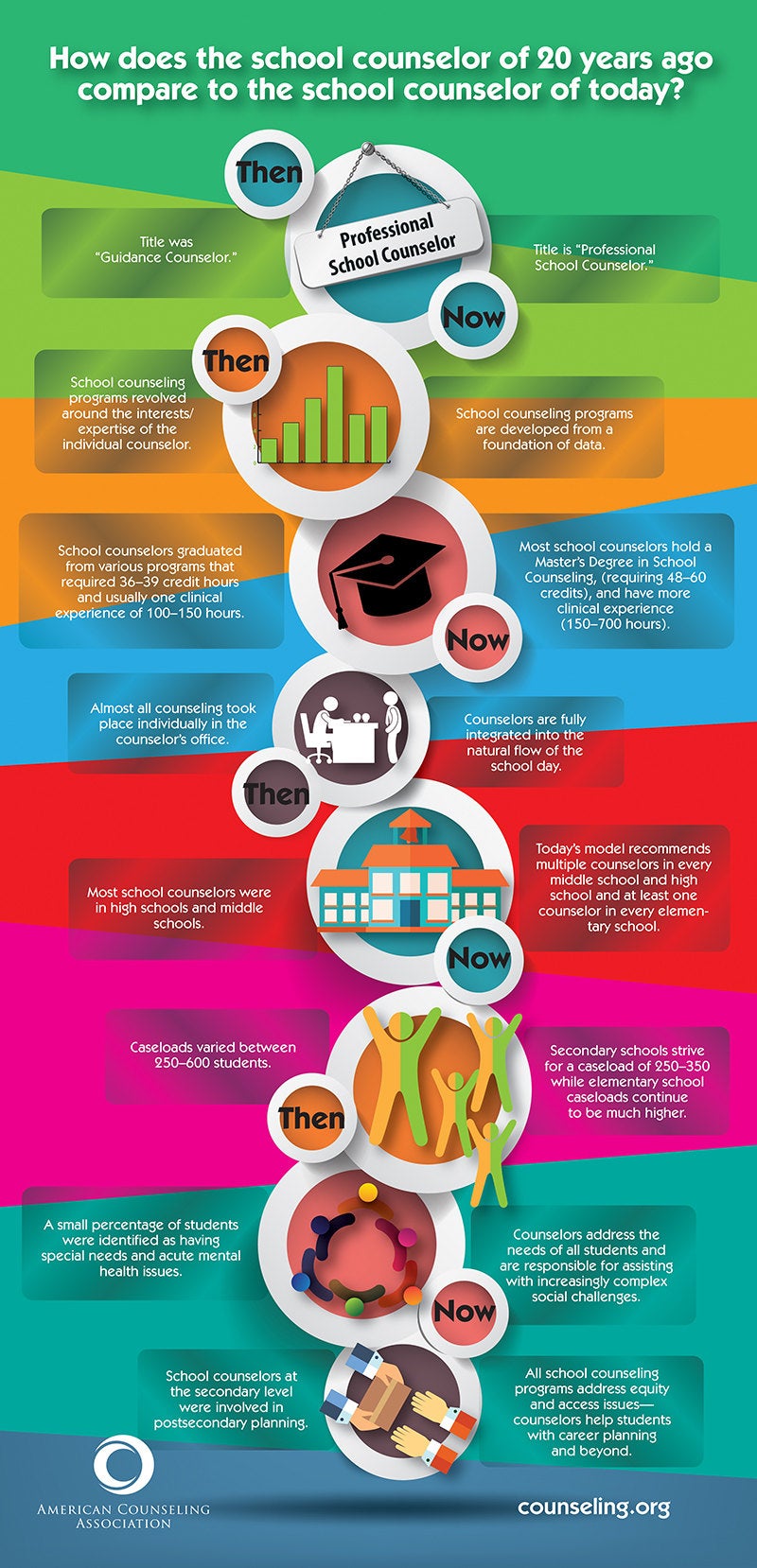Guidance vs. School Counselor: What’s the Difference?

Blog Updated on October 29, 2025.
When comparing the roles of guidance counselor vs. school counselor, it’s easy to assume that they’re interchangeable names for the same position. However, the terms reflect different eras, emphases, and professional standards.
Understanding the history, practical distinctions, and importance of these terms helps educators, families, and students set clearer expectations about services, goals, and outcomes. We should also consider how education is keeping up with the changes, and the benefits of an online Master of Science in Education School Counseling program like that offered by St. Bonaventure University Online.
Guidance Counselors: A Shift in Naming Convention
The shift from “guidance counselor” to “school counselor” began in the late 20th century as the profession sought to modernize its identity and better reflect evolving responsibilities. Historically, guidance work focused primarily on academic placement and vocational advice, helping students match their abilities to career options. As schools faced rising demands around mental health, social-emotional learning, and college access, practitioners expanded their scope.
Professional organizations and credentialing bodies encouraged a name change to emphasize a broader, student-centered approach. While some schools still use “guidance counselor,” the American School Counselor Association (ASCA) views the title as outdated.
The term “school counselor” is indicative of work inside the educational system and signals comprehensive roles that include academic planning, social-emotional support, crisis response, and advocacy. The rebranding also aligns with updated training standards, ethical codes, and evidence-based frameworks that position counselors as systemic contributors to student success rather than only individual advisers.
Learn more about SBU's Online Master's in School Counseling
Guidance Counselor vs. School Counselor: What Sets Them Apart?
The primary reason that the ASCA, as well as many counselors, prefer the term “school counselor” is simple: it more accurately reflects the role counselors play in school settings. “Guidance counselor” implies a narrow role in which the counselor only provides vocational advice. But the role of the modern school counselor is much more substantial and comprehensive than that.
The ASCA highlights the differences between the concept of the guidance counselor and the concept of the school counselor as follows.
Focus and Goals
- Guidance counselor: Traditionally centered on course selection, college and career advising, and vocational guidance
- School counselor: Emphasizes holistic student development, including academic achievement, social-emotional health, and long-term planning
Training and Credentials
- Guidance counselor: Historically, could include educators with limited specialized counseling coursework
- School counselor: Typically requires graduate training in counseling or school counseling, clinical skill development, and state certification or licensure tied to counseling competencies
Service Delivery Model
- Guidance counselor: Often approached work as case-by-case advising; services skewed toward individual planning appointments
- School counselor: Uses a tiered delivery model combining classroom lessons, small groups, and targeted interventions, plus system-wide consultation and collaboration with teachers and families
Scope of Practice
- Guidance counselor: Narrower, largely academic and career-focused
- School counselor: Broader, including mental health promotion, crisis intervention, referral to community providers, and equity-focused programming
Metrics of Success
- Guidance counselor: Measured by college placements, course enrollments, or immediate vocational matches
- School counselor: Measured by broader outcomes such as attendance, discipline reductions, social-emotional skill gains, graduation rates, and college and career readiness
Why Do Naming Conventions Matter in Counseling?
While it may feel important to school counselors to be given a title that accurately reflects their role, does it really affect their work, impact, or the perception of the job by others? The data surrounding the guidance counselor and school counselor comparison says yes.
In 2018, researchers conducted a study entitled “Guidance Counselors or School Counselors: How the Name of the Profession Influences Perceptions of Competence.” The researchers worked with a sample of 276 school counselors. Half of the participants took a research survey that used the term “guidance counselor,” while the other half were given surveys that used the term “school counselor.”
The researchers found that participants whose surveys used “guidance counselor” were statistically significantly less likely to believe that individuals with that job title were capable of completing the 25 tasks listed on the survey.
For example, survey participants were less likely to indicate that a “guidance counselor” could fulfill the role of implementing a data-informed comprehensive school counseling program. The participants indicated that the term “guidance counselor” did not lead them to believe that a person with the title would be competent to complete the job roles or tasks of a “school counselor.”
A similar survey of the general public regarding “guidance counselor” vs. “school counselor” had similar results. Participants who took a survey that used the term “guidance counselor” were statistically less likely to believe that the 25 tasks assessed on the survey could be performed properly by someone with such a role.
The results of these studies indicate that both counselors and the general public perceived guidance counselors as less competent to complete the roles and tasks described within the ASCA professional standards and competencies and the Council for the Accreditation of Counseling and Related Educational Programs (CACREP) standards.
One of These Counselors Is Not Like the Other
The American Counseling Association provides an especially helpful “then vs. now” comparison that highlights the differences in the guidance counselor vs. school counselor debate. As the descriptions above have demonstrated and this comparison highlights, the difference is not at all just a title discrepancy. Instead, it makes a meaningful difference when it comes to the role of a counselor within a school setting and the way that students experience the role of a counselor at school.
The American Counseling Association asks, “How does the school counselor of 20 years ago compare to the school counselor of today?” Their response is the following comparison, which can be found in infographic form.

Become a School Counselor Who Holistically Impacts Students
Youth mental health is under serious strain, and many young people live with depression, anxiety, and other mental health disorders, yet go without adequate treatment due to barriers such as limited insurance coverage and shortages of counseling services.
School counselors help guide students toward emotional stability and adult success; however, the profession is understaffed, and many schools fall well short of the recommended student-to-counselor ratio.
To put that another way, there’s never been a better time to get into the counseling field. The U.S. Bureau of Labor Statistics projects that positions for school and career counselors and advisors will increase by 4% between 2024 and 2034, meaning this is a field with long-term job demand.
St. Bonaventure University’s online Master of Science in Education in School Counseling will prepare you to support students in the most vital areas of development. Engaging coursework, experienced faculty, and in-field practice will teach you to support primary, middle, and high school students in ways that last for a lifetime.
Our online Master’s in School Counseling program is CACREP-accredited and offers clinical placement services. Our curriculum includes education in timely topics like play therapy and multicultural counseling.
Learn more about our online MS in Education – School Counseling and take the first step toward a career supporting the emotional well-being of children and improving outcomes.


